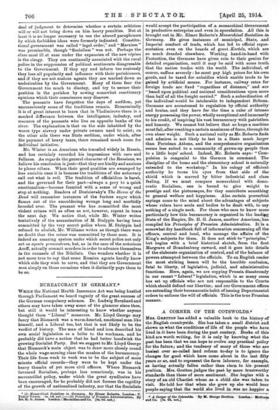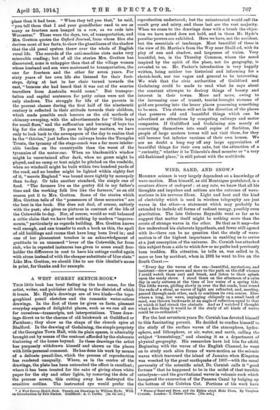A CORNER OF THE COTSWOLDS.* Mae. GBETTON has added a
valuable book to the history of the English countryside. She has taken a small district and -shown ne what the conditions of life of the people who have lived in it have been during the past century. Books of this kind.are worth :writing, for it is only by knowing what the past has been that we can hope to evolve any practical policy for the future; and the tendency of many of those who are busiest over so-called land reform to-day is to ignore the changes for good which have cocas about in the last fifty years or so, and to represent the farm labourer, for example, as having actually fallen rather than risen to his present position. Mrs. Gretton judges the past by more trustworthy standards than those of mere sentiment. She begins with a story of an old Chartist whom as a child ahe was taken to visit. He told her that when she grew up she would hear people saying that the world she lived in was no happier a • A Corner of the Cetelcolde. By Y. Sturge Gretton. London: Yethuep and Co. [7c ed. net.] Place than it had been. "When they tell.ou that," he said, -" you tell them that I and your grandfather used to see as many as fourteen men hanged in a row, as we rode into Worcester." Those were the days, too, of transportation, and Mrs. Gretton quotes the Oxford Journal, from whose files she derives most of her facts, to show the ghastliness of the shadow that the old penal system threw over the whole of English rural life. The records of the anti-machine riots make very miserable reading; but of all the stories Mrs. Gretton has discovered, none is unhappier than that of the village woman whose husband and son were sentenced to transportation, the one for fourteen and the other for seven years. For sixty years of her own life she listened for their foot- steps, dying at last in her chair turned towards the east, "because she had heard that it was out of the sunrise travellers from Australia would come." But transpor- tation and capital sentences for petty crime were not the only shadows. The struggle for life of the parents in the poorest classes during the first half of the nineteenth -century is reflected in their attitude towards their children, which made possible such horrors as the old methods of chimney-sweeping, with the advertisements for "little boys for small flues," and the suffocation and burning of boys too big for the chimney. To pass to lighter matters, we have only to look back to the newspapers of the day to realize that in the "thirties," just before the railways broke the Turnpike Trusts, the tyranny of the stage-coach was a far more intoler- able burden on the countryside than the worst of the tyrannies of the motor-car. When no blacksmith's window might be uncurtained after dark, when no game might be played, and no camp or tent might be pitched on the roadside, when no windmill might be built within two hundred yards of the road, and no bonfire might be lighted within eighty feet of it, " merrie England " was bound more tightly by monopoly than to-day. Or take another standard, the simple one of food. " The farmers live as the gentry did in my father's time and the working folk live like the farmers," as an old mason put it to Mrs. Gretton. Some of the stories which Mrs. Gretton tells of the "possessors of these memories" are the best in the book. She does not deal, of course, entirely with the past; she gives us pictures in contrast of the life of the Cotswolds to-day. Nor, of course, would so well balanced a critic claim that we have lost nothing by modern "improve- ments," particularly as regards building. Mrs. Gretton knows well enough, and can transfer to such a book as this, the spell of old buildings and rooms that have long been lived in; and• one of her pleasantest touches is an acknowledgment of gratitude to an unnamed " lover of the Cotswolds, far from rich, who in repeated instances has given to some small free- holder the difference in cost to have hie cottage roofed again with atone instead of with the cheaper substitute-of blue -slate," Like Mrs. Gretton, we should like to see this idealist's name in print, for thanks and for example.



























































 Previous page
Previous page